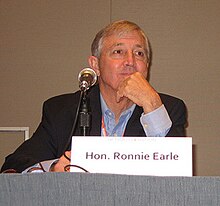This article has multiple issues. Please help improve it or discuss these issues on the talk page. (Learn how and when to remove these messages)
|
Ronnie Earle | |
|---|---|
 Earle on a panel on ethics and government at Netroots Nation in Austin, Texas, July 2008 | |
| District Attorney for Travis County, Texas | |
| In office 1977–2009 | |
| Preceded by | Robert O. Smith |
| Succeeded by | Rosemary Lehmberg |
| Member of the Texas House of Representatives from the 37-3 district | |
| In office July 29, 1973 – December 14, 1976 | |
| Personal details | |
| Born | Ronald Dale Earle February 23, 1942 Fort Worth, Texas |
| Died | April 5, 2020 (aged 78) Austin, Texas, U.S. |
| Political party | Democratic |
Ronald Dale Earle (February 23, 1942 – April 5, 2020) was an American politician and judge who was, from January 1977 to January 2009, the District Attorney for Travis County, Texas. He became nationally known for filing charges against House majority leader Tom DeLay in September 2005 for conspiring to violate Texas' election law and/or to launder money. In Texas, Earle was known for his criminal justice reform efforts which focused on crime prevention, alternative sentencing, victim advocacy, and the reintegration of former offenders into society. In 1983, Earle – an Eagle Scout – prosecuted himself for an election law violation after missing a campaign finance filing deadline by one day; he was fined $212.[1] Earle was a fixture in Travis County politics and served in public office there for more than 30 years, joking that he was asked if he was the "District Eternity".[2]
Earle spoke extensively on his belief that the law guided public responses to crime but that it was society's collective "ethics infrastructure" that required support to deliver a safer, more just, and more livable community. This belief guided him, as he told the Austin Chronicle in 2008, "It really informs everything I've tried to do – well, not everything, but most of the things I've tried to do as district attorney, especially the most progressive and innovative things that we have done in this office. And the reason is because the law doesn't teach you how to act. ... What I have come to call the 'ethics infrastructure' teaches you how to act. And that is in that work of mommas and daddies and aunts and uncles and teachers and preachers and neighbors and cousins and friends – that's where you learn how to act, not from the law."[3]
- ^ Axtman, Kris (December 3, 2004). "The Texas DA pitted against the power of Tom DeLay". Christian Science Monitor. Retrieved November 4, 2009.
- ^ "Former Travis County D.A. Ronnie Earle Dies". www.austinchronicle.com.
- ^ "District Eternity". www.austinchronicle.com.